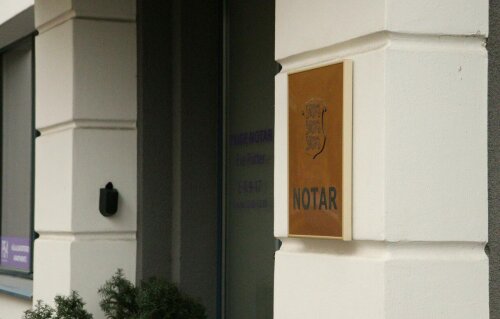Best Trusts Lawyers in Estonia
Share your needs with us, get contacted by law firms.
Free. Takes 2 min.
Or refine your search by selecting a city:
List of the best lawyers in Estonia
About Trusts Law in Estonia
In Estonia, the concept of a "trust" is not part of the traditional legal framework as it is in common law jurisdictions like the United Kingdom or the United States. Instead, Estonia uses structures like foundations and contracts to achieve similar goals of asset management and protection. A foundation can be used for asset management without having beneficiaries involved in the management, similar to a trust. However, applying foreign trusts within Estonia can be complex and requires careful legal handling to navigate the differences in legal systems.
Why You May Need a Lawyer
There are several situations where individuals and businesses might seek legal assistance with trusts or similar structures in Estonia:
- Setting up a Foundation: For those wishing to create a structure similar to a trust, legal expertise is important in establishing and managing a foundation, as Estonian laws will apply.
- Inheritance Planning: Trust-like structures can play a key role in estate planning and inheritance issues, ensuring asset transfer according to the founder’s wishes.
- Asset Protection: Ensuring assets are managed efficiently and protected against future liabilities may necessitate the use of structures that require legal clarification.
- Cross-Border Considerations: For those who may want to bring a foreign trust into the Estonian legal framework, navigating the legal system requires expert help.
Local Laws Overview
Estonian legal system does not formally recognize trusts, but certain arrangements and entities may fulfill similar functions. Here are key aspects to consider:
- Foundations: These are often used similarly to trusts for managing assets, with clear regulations about their operation and purpose under Estonian law.
- Contractual Agreements: Since Estonia adheres to civil law, contractual agreements are pivotal in establishing the roles and obligations similar to a trust.
- EU Regulations: As an EU member, Estonia’s handling of foreign-based trusts is also subject to European Union regulations which can affect how trusts are recognized and enforced.
Frequently Asked Questions
What is a foundation in Estonia, and how does it relate to trusts?
A foundation in Estonia is a legal entity that can hold assets and manage them under specific purposes similar to a trust's objectives but is set within the civil law context.
Can a foreign trust be enforced in Estonia?
Though Estonia does not recognize trusts, certain aspects may be enforceable through the civil law system, often requiring legal translation into recognized structures like contracts or foundations.
What are the benefits of using a foundation in estate planning?
A foundation can offer structured asset management without daily involvement from beneficiaries and can align with inheritance planning laws in Estonia.
How complex is it to set up a foundation in Estonia?
Setting up a foundation requires adhering to Estonian legal regulations, and it often involves legal guidance, especially on statutory and tax obligations.
Can foreigners establish a foundation in Estonia?
Yes, foreigners can establish foundations in Estonia, though they must comply with specific legal and regulatory requirements.
Does Estonia offer tax benefits for charitable foundations?
Charitable foundations may enjoy certain tax advantages, but this requires strict compliance with Estonian tax regulations and criteria for charitable status.
Is there a regulatory body overseeing foundations in Estonia?
Yes, foundations are overseen by the Estonian Centre of Registers and Information Systems, which ensures compliance with local laws.
How does EU law affect trusts and similar structures in Estonia?
EU regulations can influence the treatment and recognition of trust-like structures, especially in cases with cross-border implications.
What are the legal obligations of managing a foundation?
Foundations must adhere to transparent financial reporting, statutory purpose fulfillment, and compliance with governance laws.
Can ownership in a foundation be transferred like a trust?
Ownership per se isn't the same as in trusts, but control and directive powers can be changed following Estonian legal procedures.
Additional Resources
Consider reaching out to the following resources for further guidance:
- Estonian Bar Association: A professional body for lawyers in Estonia that can connect you with legal experts in trusts and foundations.
- Estonian Centre of Registers and Information Systems: Manages the registration and information systems for legal entities like foundations.
- Ministry of Finance of Estonia: For understanding tax implications and benefits associated with charitable foundations.
Next Steps
If you require legal assistance related to trusts in Estonia, consider the following actions:
- Consult a Lawyer: Engage with a lawyer who specializes in foundations and estate planning to navigate the Estonian legal landscape.
- Conduct Research: Gather as much information as possible about your legal needs and any international implications.
- Prepare Documentation: Ensure all documents are in order for establishing or managing a foundation effectively.
- Understand Compliance: Be aware of local compliance requirements and engage suitable professionals to maintain adherence.
Lawzana helps you find the best lawyers and law firms in Estonia through a curated and pre-screened list of qualified legal professionals. Our platform offers rankings and detailed profiles of attorneys and law firms, allowing you to compare based on practice areas, including Trusts, experience, and client feedback.
Each profile includes a description of the firm's areas of practice, client reviews, team members and partners, year of establishment, spoken languages, office locations, contact information, social media presence, and any published articles or resources. Most firms on our platform speak English and are experienced in both local and international legal matters.
Get a quote from top-rated law firms in Estonia — quickly, securely, and without unnecessary hassle.
Disclaimer:
The information provided on this page is for general informational purposes only and does not constitute legal advice. While we strive to ensure the accuracy and relevance of the content, legal information may change over time, and interpretations of the law can vary. You should always consult with a qualified legal professional for advice specific to your situation.
We disclaim all liability for actions taken or not taken based on the content of this page. If you believe any information is incorrect or outdated, please contact us, and we will review and update it where appropriate.
Browse trusts law firms by city in Estonia
Refine your search by selecting a city.
















